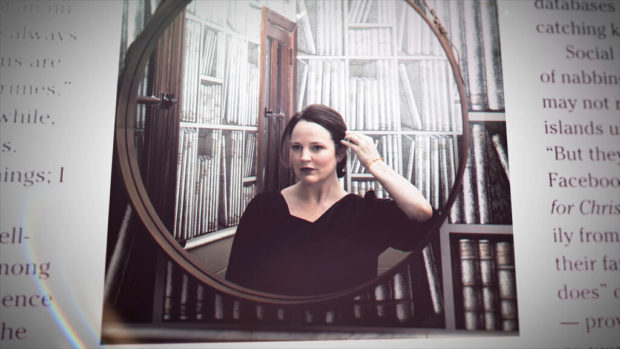New HBO series looks at lives disrupted by a serial killer

This image released by HBO shows late writer Michelle McNamara from the six-part docuseries “I’ll Be Gone in the Dark,” debuting on Sunday. (HBO via AP)
NEW YORK — It’s said that documentary filmmaking is all about being in the right place at the right time. If so, director Liz Garbus has been doubly lucky with her latest project.
Two years ago, she and her team started filming their series on the hunt for the still-unknown Golden State Killer, whose trail had been cold for more than 30 years. The very next day, a suspect was arrested.
“If you’re making a documentary and everything happens as expected, isn’t that boring?” she asks, laughing. “Why are you bothering?”
Garbus kept filming and the result is “ I’ll Be Gone in the Dark,” a six-part documentary series debuting Sunday on HBO. It also premieres with perfect timing.
In a twist that seems almost too well scripted, the day after the first episode airs, the Golden State Killer suspect is expected to plead guilty in a California courtroom.
Article continues after this advertisementThe filmmakers were able to pivot in large part because “I’ll Be Gone in the Dark” is not really about the killer himself but rather the survivors of his terror. It’s framed through the life of the late crime writer Michelle McNamara.
Article continues after this advertisement“It’s very weird timing, but that’s the way things go sometimes. It just happens,” said comedian Patton Oswalt, who was married to McNamara.
McNamara spent years working out her obsession with the Golden State Killer and hunting for his identity, which filled the manuscript of her “I’ll Be Gone in the Dark.” After her death from an accidental drug overdose in 2016, the book was finished by fellow investigators and became a bestseller. HBO tapped Garbus to turn it into a series.
The Golden State Killer is suspected of at least 13 murders and more than 50 rapes across California from 1974-1986. The armed and masked rapist would tie up any man he found in the house and pile dishes on his back, threatening to kill both victims if he heard the plates jiggle while he assaulted the woman.
DNA evidence in 2018 led authorities to arrest Joseph DeAngelo, a former police officer. While McNamara’s work didn’t directly lead police to the arrest, she and her fellow civilian online sleuths kept pushing the case.
“I’ll Be Gone in the Dark” is rich and compelling, part of a recent wave of documentary films that lift up the survivors of violence, like “Surviving R. Kelly,” “Finding Neverland” and “Jeffrey Epstein: Filthy Rich.”
The first four episodes of the new series don’t even mention DeAngelo. “In some ways, he is an afterthought because the survivors are much more interesting,” Garbus said.
One Golden State Killer victim was 15 when she was attacked while playing the piano at home and stopped playing it forever shortly thereafter. “It was just a few hours, but it changed everything,” she says in the film.
The series ends on a triumphant note with a gathering of the aging men and women whose lives were turned upside down by the predator but who suffered quietly for years due to societal stigma. Now they are raising their voices.
“If DeAngelo pleads guilty on Monday, that will be I think an important step forward. But, to me, the fact that they have really triumphed over that silence is really the culmination of the story,” Garbus said.
Garbus and her team — including directors Elizabeth Wolff, Myles Kane and Josh Koury — used archival footage, recreated crime scenes and conducted extensive interviews with amateur detectives, retired detectives and even DeAngelo’s family members and ex-fiancée.
Oswalt offered up texts, emails, photos and voicemails. Actress Amy Ryan was tapped to read McNamara’s diary and writings. Oswalt says Garbus did “an amazing job.” She “definitely told the story the way it needed to be told and put the focus on the right places.”
McNamara was herself a victim of sexual assault, and the film suggests that past likely influenced her drive to unmask the Golden State Killer. “The unidentified murderer is always twisting a doorknob behind a door that never opens,” she once wrote.
Garbus structured the series as an investigative and personal journey, faithful to the book it is based on. It also artfully incorporates everything from the goofy Italian sci-fi film “Creature from the Black Lagoon” to paintings at The Louvre.
The filmmaker has previously pointed her lens at the prison system and The New York Times. She also made an Academy Award-nominated documentary about Nina Simone. Being able to improvise as a documentary-maker is one of her hallmarks.
“You learn to roll with these twists and turns,” she said from her home in Brooklyn. “I’m definitely used to kind of being responsive and in the moment.”